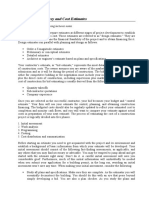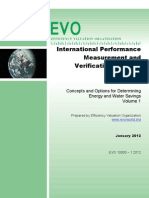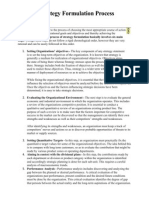FAQs Comparison of ECC With ICE Conditions
FAQs Comparison of ECC With ICE Conditions
Uploaded by
Harish NeelakantanCopyright:
Available Formats
FAQs Comparison of ECC With ICE Conditions
FAQs Comparison of ECC With ICE Conditions
Uploaded by
Harish NeelakantanOriginal Description:
Copyright
Available Formats
Share this document
Did you find this document useful?
Is this content inappropriate?
Copyright:
Available Formats
FAQs Comparison of ECC With ICE Conditions
FAQs Comparison of ECC With ICE Conditions
Uploaded by
Harish NeelakantanCopyright:
Available Formats
Comparison of ECC with ICE Conditions of Contract While both the ECC and ICE Conditions of Contract are
produced by the Institution of Civil Engineers, they are like comparing chalk with cheese. There are some similarities but essentially they are fundamentally different contracts We start with some of the more basic questions asked by potential ECC users, following on in the next issue with some more advanced queries.
Type of project Question On what type of project could we use ECC? Answer The ICE Conditions are for use in connection with works of civil engineering construction , the ECC is for any work which could be defined as engineering and/or construction and thus embraces civil engineering, building, process and all allied industries.
Use of engineers Question Is it true that we do not have an engineer under the ECC? Answer Of course ECC uses engineers, their role being dependent on the type of project, but ECC does not name an engineer who takes design responsibility and also administers the contract. This is a principle difference from the ICE Conditions. On an ECC project the employer will appoint the following parties. Project manager appointed by the employer, either from its own staff, or from an outside body. The project manager s role is to manage the contract for the employer to achieve the employer s objectives for the completed project. The project manager may be an engineer, architect, quantity surveyor or any other discipline dependent on the type of project and the employer s preference, but in all cases it must be someone who has sufficient knowledge of the contract and the role of the project manager to be able properly to carry out that role. This is an important point as some project managers do not have that knowledge and subsequently have stated that they felt that ECC was not that different from other contracts and left the parties with the same problems as ICE contracts. Supervisor appointed by the employer for a particular contract. Again, the supervisor can be either from the employer s own staff, or from an outside body. Essentially, the supervisor s role is to check that the works are carried out in accordance with the contract. This role can be likened to that of a clerk of works or resident engineer in other contracts.
Design and construct Question Is there a design and construct version of the ECC? Answer Under the ICE Conditions of Contract the liability of the contractor is subject to the important qualification that it is generally not liable for the design or specification of the permanent works or of temporary works designed by the engineer. Therefore a division of responsibility is maintained such that the contractor undertakes to construct according to the engineer s design. Under the ECC any or all of the design responsibility, and ultimately the liability for that design, can be apportioned to the contractor through the works information; there is no separate contract document to cover design and construct contracts.
Programmes Question I have heard that the programme requirement is more onerous under an ECC contract? Answer I am not sure that onerous is the right word for something that is designed to help the parties to manage their projects better! The ICE Conditions state the works commencement date and the time for completion and, under clause 14, the Contractor shall submit to the Engineer for his acceptance a programme showing the order in which he proposes to carry out the Works , the submission of a programme is an express requirement with set time scales for submission and acceptance/rejection of the programme and revisions. The general position is that the contractor has an obligation to complete the works within the time stated in the contract, and it is up to the contractor to arrange its operations to achieve this result. Under the ECC, the preparation, submission and acceptance of the contractor s programme are key elements of managing the contract as well as reporting progress. Provision is made for a programme either to be identified by the contractor in the contract data part two at the contract date or to be submitted by the contractor within a period stated in the contract data part one. The programme is an important document for administering the contract. It enables progress to be monitored and the time effects of compensation events to be assessed, including changes to the completion date. Any programme submitted for acceptance is required to show: dates which are stated in the contract data or the works information (e.g. starting date, possession date and completion date) a method statement for each operation which identifies the equipment and other resources which the contractor plans to use order and timing of operations float and, separately, time risk allowances health and safety requirements dates when the contractor requires information, facilities, access and so on to be provided to it by the employer other information required in the works information. Within two weeks of the contractor submitting a programme, or a revised programme, the project manager either accepts it or notifies the contractor of reasons for not accepting it. The contractor is then required to submit revised programmes showing the actual progress achieved on each operation and its effect on remaining work, the reprogramming of future operations, the effect of implemented compensation events and early warning matters, and how the contractor intends to deal with any delays. If a compensation event affects the timing of future operations, a revised programme indicating the effects is to be submitted as part of the contractor's quotation (clause 62.2).
Claims Question Do you have fewer claims under the ECC than under the ICE Conditions? Answer Yes, in fact there are no claims at all in the normal sense under the ECC as it deals with changes and their effects on price and programme in a different way to more traditional contacts. Firstly most traditional contracts price variations on the following basis: where additional or substituted work is similar, executed under similar conditions and does not significantly change the quantity of work set out in the contract bills, the rates and prices in the bills apply where the additional or substituted work is of similar character but is not executed under similar conditions and/or significantly changes the quantity of the work set out, bill rates and prices shall be the basis for determining the valuation where the additional or substituted work is not of similar character to work set out in the contract bills, fair rates and prices shall apply if the work cannot be measured, or is specifically instructed, daywork can be used for valuing the variation. There are separate provisions for extensions of time and loss and expense. Under the ECC, variations such as changes to the works information are compensation events and are assessed based on the forecast effect on actual cost (plus fee percentage) and any delay to the completion date. Any extension of time and/or loss of expense are therefore assessed within the compensation event that caused the delay and/or cost. Compensation events are priced and submitted by the contractor within three weeks of being instructed to do so, and the project manager responds within two weeks. The final account and any claims issues (ECC does not use the words final account or claim) are thus dealt with in a formal manner as the work progresses.
You might also like
- A Way To Successful Contract ManangementDocument6 pagesA Way To Successful Contract Manangementtsar_philip2010No ratings yet
- Top 10 Elements in A Successful Environmental SystemDocument2 pagesTop 10 Elements in A Successful Environmental Systemhappyman7100% (1)
- Article No. 1 To Go Retrospective, or To Go Prospective by Chris LarkinDocument3 pagesArticle No. 1 To Go Retrospective, or To Go Prospective by Chris LarkinBox DriveNo ratings yet
- Case Digest CivilDocument2 pagesCase Digest CivilRen Irene D Macatangay100% (4)
- FedEx Crush ReportDocument45 pagesFedEx Crush ReportKyle WeitekampNo ratings yet
- MPL Article Managing An NEC3 ProgrammeDocument9 pagesMPL Article Managing An NEC3 Programmecv21joNo ratings yet
- Assisgnment No 4 Contract Management PDFDocument39 pagesAssisgnment No 4 Contract Management PDFNizar AhamedNo ratings yet
- Nick Gould - Standard Forms JCT 2005Document32 pagesNick Gould - Standard Forms JCT 2005John WoodNo ratings yet
- Valuation MethodDocument3 pagesValuation MethodviganjorebicNo ratings yet
- Appendix I Contractor ' S Overhead CostsDocument5 pagesAppendix I Contractor ' S Overhead CostsZoki JevtićNo ratings yet
- Calculation of HOOH 1Document2 pagesCalculation of HOOH 1Manoj LankaNo ratings yet
- Indus - Overhead Cost - Swati S PatilDocument6 pagesIndus - Overhead Cost - Swati S PatilTJPRC PublicationsNo ratings yet
- Hudson 1Document9 pagesHudson 1Nawaz KhanNo ratings yet
- Overheads - Loss & Expense ClaimsDocument2 pagesOverheads - Loss & Expense ClaimsSampath BandaraNo ratings yet
- Sub-Clause 20.1 - The FIDIC Time Bar Under Common and Civil LawDocument15 pagesSub-Clause 20.1 - The FIDIC Time Bar Under Common and Civil LawMilan UljarevicNo ratings yet
- Module 2Document120 pagesModule 2osman14499No ratings yet
- Contract Management PlanDocument2 pagesContract Management PlanHelloNo ratings yet
- Profit & OverheadsDocument3 pagesProfit & OverheadsFrank Victor MushiNo ratings yet
- Data ManagementDocument22 pagesData Managementkenneth sanchezNo ratings yet
- Contract Negotiation DataDocument1 pageContract Negotiation DatasfreigaNo ratings yet
- Evs PPT Eia 91-100Document30 pagesEvs PPT Eia 91-100Saakshi KariaNo ratings yet
- PIF - Public Investment Fund - PIFDocument6 pagesPIF - Public Investment Fund - PIFsebastienNo ratings yet
- Claims On Construction Projects - Quantification and Prevention - NotesDocument2 pagesClaims On Construction Projects - Quantification and Prevention - NotesMaciej MzykNo ratings yet
- Waste-Management EDITEDDocument20 pagesWaste-Management EDITEDpshantanu123No ratings yet
- AECOM Case StudyDocument3 pagesAECOM Case StudyJavith JackNo ratings yet
- 2 Introduction DescriptionDocument23 pages2 Introduction DescriptionKhaidhir HarunNo ratings yet
- 4 Risk Allocation in The FIDIC Conditions of ContractDocument5 pages4 Risk Allocation in The FIDIC Conditions of ContractAnonymous 94TBTBRksNo ratings yet
- Unit-6 Environmental ServicesDocument31 pagesUnit-6 Environmental ServicesGM NGNo ratings yet
- Outturn Cost: Find Out MoreDocument5 pagesOutturn Cost: Find Out MoreMohamed BahkirNo ratings yet
- Introduction and Scope PDFDocument10 pagesIntroduction and Scope PDFNarendra Srivatsa YellapuNo ratings yet
- IACCM CCM Certification ProgrammeDocument4 pagesIACCM CCM Certification ProgrammeNavneet SinghNo ratings yet
- Quantity Survey and Cost EstimatesDocument4 pagesQuantity Survey and Cost Estimatesfelix mapilesNo ratings yet
- FIDIC Seminar BrochureDocument4 pagesFIDIC Seminar Brochure8790922772No ratings yet
- 2Document6 pages2AbubakarBinAbdullahNo ratings yet
- Network DiagramsDocument8 pagesNetwork Diagramscrystal50% (2)
- Disruption PDFDocument9 pagesDisruption PDFOsmanRafaeeNo ratings yet
- Barcelona GuideDocument72 pagesBarcelona GuidesinusoccultusNo ratings yet
- ContractDocument16 pagesContractMuaz MisranNo ratings yet
- Time Related DelayDocument2 pagesTime Related DelayMohamed El AbanyNo ratings yet
- PertDocument27 pagesPertmahadeopgNo ratings yet
- Project Cost Management: Dhammika T. GamageDocument45 pagesProject Cost Management: Dhammika T. GamageNiranjan AbeyrathnaNo ratings yet
- هيئة البيئة ابوظبيDocument41 pagesهيئة البيئة ابوظبيashawishNo ratings yet
- 6.7 Control Schedule: Monitoring and ControllingDocument6 pages6.7 Control Schedule: Monitoring and ControllingAh GusNo ratings yet
- Solar Panels 1 ST Light EnergyDocument29 pagesSolar Panels 1 ST Light EnergyMarifer PerezNo ratings yet
- Types of Contract 2013 Hand Outs PDFDocument34 pagesTypes of Contract 2013 Hand Outs PDFNavajyoth ReddyNo ratings yet
- Time Bars and Their Enforceability in English Law EPC ContractsDocument3 pagesTime Bars and Their Enforceability in English Law EPC ContractsMuhammad TalhaNo ratings yet
- PM Raci MatrixDocument7 pagesPM Raci MatrixLidiane CastroNo ratings yet
- Society of Construction Law (UAE)Document11 pagesSociety of Construction Law (UAE)Ahmed AbdulShafiNo ratings yet
- 1 - Mr. Toby Randle - FIDIC Red and Pink Books DevelopmentDocument15 pages1 - Mr. Toby Randle - FIDIC Red and Pink Books DevelopmentMin Chan MoonNo ratings yet
- Delay Analysis TechniquesDocument10 pagesDelay Analysis TechniquesfmtbelloNo ratings yet
- SCL D176 Bailey Jan15Document28 pagesSCL D176 Bailey Jan15MOHNo ratings yet
- Earned Value Management ExplainedDocument3 pagesEarned Value Management ExplainedAndi FachriyantoNo ratings yet
- An Analysis of EIA Report of The Second International Airport Project, NepalDocument11 pagesAn Analysis of EIA Report of The Second International Airport Project, NepalBijay ThapaNo ratings yet
- Steps in Preparation of WorkplanDocument12 pagesSteps in Preparation of WorkplanMuhammad ZubairNo ratings yet
- Chapter4 Project Time ManagementDocument28 pagesChapter4 Project Time ManagementajayikayodeNo ratings yet
- Eia Process Flow Chart: ContDocument2 pagesEia Process Flow Chart: Contshreek16No ratings yet
- Price List - Fidic DocumentsDocument3 pagesPrice List - Fidic DocumentsShahnawaz AzizNo ratings yet
- Contract Management Process A Complete Guide - 2021 EditionFrom EverandContract Management Process A Complete Guide - 2021 EditionNo ratings yet
- Title Ownership in GoodsDocument6 pagesTitle Ownership in GoodsHarish NeelakantanNo ratings yet
- Claims by A ContractorDocument6 pagesClaims by A ContractorHarish NeelakantanNo ratings yet
- Engineering and Construction ContractDocument8 pagesEngineering and Construction ContractHarish NeelakantanNo ratings yet
- Client - Project Manager Agreement - ACPMDocument26 pagesClient - Project Manager Agreement - ACPMgantasri8100% (1)
- NEC Contracts - One Stop ShopDocument3 pagesNEC Contracts - One Stop ShopHarish NeelakantanNo ratings yet
- The Use of Nec Engineering and Construction ContractDocument16 pagesThe Use of Nec Engineering and Construction ContractHarish Neelakantan100% (3)
- Rules and Rituals of BrahminsDocument9 pagesRules and Rituals of BrahminsHarish NeelakantanNo ratings yet
- BBQ Fun LeanerDocument36 pagesBBQ Fun Leanerthib100% (1)
- Supply Chain RelationshipsDocument34 pagesSupply Chain RelationshipsRahul KhannaNo ratings yet
- Converting A Manual RTG Terminal To An AutoRTG TerminalDocument16 pagesConverting A Manual RTG Terminal To An AutoRTG Terminalacanbasri1980No ratings yet
- RUBRICSDocument2 pagesRUBRICSGerald ManalastasNo ratings yet
- Thursday, September 20, 2012: Davanagere To Bangalore VRL TravelsDocument1 pageThursday, September 20, 2012: Davanagere To Bangalore VRL TravelsAnonymous mcHqIfbnV1No ratings yet
- The Last 50 Years in Growth Theory and The Next 10 - R. SolowDocument12 pagesThe Last 50 Years in Growth Theory and The Next 10 - R. SolowLuis Enrique V ANo ratings yet
- Havells R&DDocument81 pagesHavells R&Daryanboxer786No ratings yet
- Bullish Candle:: We Will Be Learning The Following 1.marubozuDocument21 pagesBullish Candle:: We Will Be Learning The Following 1.marubozuManoj KumarNo ratings yet
- Quizzes - Topic 2 - Attempt ReviewDocument11 pagesQuizzes - Topic 2 - Attempt ReviewHà Mai VõNo ratings yet
- HALL Vs PiccioDocument2 pagesHALL Vs PiccioPingLomaadEdulanNo ratings yet
- Deutsche Bank ResearchDocument6 pagesDeutsche Bank ResearchMichael GreenNo ratings yet
- Code ListDocument26 pagesCode ListaNo ratings yet
- Your Story Equity CompaniesDocument9 pagesYour Story Equity CompaniesArora YarnNo ratings yet
- Elektrisiteit 1eDocument6 pagesElektrisiteit 1eSanthosh RMNo ratings yet
- Acatech STUDIE Maturity Index Eng WEB PDFDocument60 pagesAcatech STUDIE Maturity Index Eng WEB PDFCarlos MolinaNo ratings yet
- Iso 37001 Anti Bribery MssDocument8 pagesIso 37001 Anti Bribery MssDisha Shah0% (1)
- Excel Consultancy Rate Cost Calculator TemplateDocument4 pagesExcel Consultancy Rate Cost Calculator TemplateHamid Mansouri0% (1)
- Chapter 5 - Plant LayoutDocument22 pagesChapter 5 - Plant LayoutSuresh BhatNo ratings yet
- English 2Document77 pagesEnglish 2alemrajabi.safatNo ratings yet
- It 2017 18Document4 pagesIt 2017 18OMENo ratings yet
- 2012 International Performance Measurement and Verification Protocol (IPMVP®)Document143 pages2012 International Performance Measurement and Verification Protocol (IPMVP®)Ravi ShankarNo ratings yet
- A Note On Comdisco - S Lease AccountingDocument25 pagesA Note On Comdisco - S Lease AccountingHussain HaidryNo ratings yet
- Rmo 69-2010Document4 pagesRmo 69-2010Sammy AsanNo ratings yet
- Bitanga V PyramidDocument7 pagesBitanga V PyramidruslanmanagoNo ratings yet
- A Case Study and Presentation of TATA NANODocument11 pagesA Case Study and Presentation of TATA NANOK Y RajuNo ratings yet
- Bajaj XCDDocument4 pagesBajaj XCDshruti.shindeNo ratings yet
- Steps in Strategy Formulation ProcessDocument2 pagesSteps in Strategy Formulation ProcessamingaNo ratings yet
- 17 Digest Po Yeng Cheo vs. Lim Ka Yam, 44 Phil 172 (1922)Document1 page17 Digest Po Yeng Cheo vs. Lim Ka Yam, 44 Phil 172 (1922)Xing Keet LuNo ratings yet
































































































